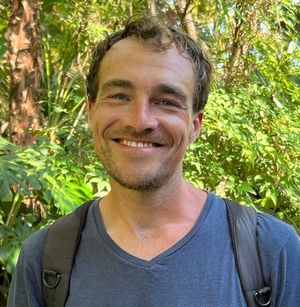Observations about my Journey
My first encounter with models of psychological behavior was an online version of David Kiersey’s MBTI-adjacent Temperament Sorter at the age of 14 in the ‘90s when the Internet was still young, authentic, and aesthetically horrendous. At the time, it would have been inconceivable for me to understand how that chance informational encounter would come to define much of my external activity as well as the principle preoccupations of my thoughts and internal life.
During the past decade, through my work at Exosphere, I had the extraordinary opportunity to interact in a deep and intimate context with more than 300 individuals who attended our 6-12 week educational programs, and in shorter form and lighter touch with 1,500 others in my traveling workshop series, as well as through my mentoring work with the Cocoon program in Estonia.
I have pursued my exploration of the human mind “in the wild”, that is, outside of the confines and games of academia, the clinic, and the corporate HR department. While these environments produce certain kinds of information that would be far more difficult to attain outside of them, they are nonetheless artificial, human-constructed contexts removed from the reality of domesticated daily life, and all the more so from wild Nature whose vicissitudes forged us over billions of years of evolutionary process.
The importance of this distinction is difficult to overstate. Humans have likely possessed linguistic capabilities for at least 100,000 years, and contemporary scholarship points to the possibility that the earliest humans had more advanced communication systems than other primates as far back as 2.5 million years ago. In The Everlasting Man, G.K. Chesterton beautifully and pertinently observes the characteristic problem with humanity and and our relationship with the past, especially the distant past:
Human civilization is older than human records. That is the sane way of stating our relations to these remote things. Humanity has left examples of its other arts earlier than the art of writing; or at least of any writing that we can read. But it is certain that the primitive arts were arts; and it is in every way probable that the primitive civilisations were civilisations. The man left a picture of the reindeer, but he did not leave a narrative of how he hunted the reindeer; and therefore what we say of him is hypothesis and not history. But the art he did practice was quite artistic; his drawing was quite intelligent, and there is no reason to doubt that his story of the hunt would be quite intelligent, only if it exists it is not intelligible. In short, the prehistoric period need not mean the primitive period, in the sense of the barbaric or bestial period. It does not mean the time before civilisation or the time before arts and crafts. It simply means the time before any connected narratives that we can read. This does indeed make all the practical difference between remembrance and forgetfulness; but it is perfectly possible that there were all sorts of forgotten forms of civilization, as well as all sorts of forgotten forms of barbarism.
In the scale of 2.5 million years, or even of 100,000, the mere 1,000 during which there have been universities, the 100 during which there were psychiatric clinics, and the less than 50 during which there have been corporate HR departments indicate how out-of-context our concern with the mind truly is.
We are witnessing a psychological crisis in the Western world today. Rates of anxiety, depression, post-traumatic stress disorder, and suicide have skyrocketed in the past two decades, and are now accelerating at an accelerating pace. The inability of the established approaches to psychological treatment — and indeed the entire framework of clinicalizing all mental-emotional suffering — indicates there is more to the problem facing the field than its research methods.
My hope is to invite people, of whatever background, into a new dialogue about the human mind, and about the diversity of experience between individuals, not only in lived facts, but even in the perceptions of the same facts.
The ideas and observations I will present in the coming weeks and months are the result of a genuine attempt to seek truth and understanding of the human condition and the nature of the human spirit in its (continued!) evolutionary context. I have been influenced by a wide array of writers and researchers hailing from a variety of fields and disciplines: philosophy, psychology, medicine, philology, history, economics, evolutionary biology, theology, and so forth. Anybody making observations about human behavior potentially has something to offer these investigations.
To the extent that we could again consider science to be detective work rather than expert analysis, these investigations would be all the easier. The need and desire to ‘prove’ something ‘true’ in order to take credit for being first, or unique in an observation is part of the egoic finite game mentality that has led us far astray. The detective, unlike the expert, simply proceeds on a mission to un-cover and dis-cover previously unknown information, and then connect the dots between disparate kinds and sources of information.
However neatly and tidily I have attempted to conduct my work, there will always be rough edges, unexplainable phenomena, outliers, etc. for which my observations will be unable to account. Upon cross-examination, my readers may even become frustrated and annoyed that my response to numerous interrogatories will be “I don’t really know” and “If only I could figure that one out!” and the like. I am well aware that what I present, after 10 years of effort, is only the very beginning of the labor, and I expect that it will remain incomplete when I myself am finished with my part of it.
The human is an animal body with a divine mind, united in the singular spirit of Nature.
As Ralph Waldo Emerson writes in “The Over Soul”,
...the heart in thee is the heart of all; not a valve, not a wall, not an intersection is there anywhere in nature, but one blood rolls uninterruptedly an endless circulation through all men, as the water of the globe is all one sea, and, truly seen, its tide is one.
This ineffable unity is the stuff of religion, the perennial philosophy toward which every local, particularized religion points. Whether the human pursuit of self-understanding continues another century or another hundred centuries, no progress toward a comprehensive understanding will ever be made, just as additions to infinity cannot augment its contents.
While the perspective from that objective fantasy may be grim, from our individual subjective perspectives, each addition improves the quality of our decision-making, helps us reduce error and imprecision in our communication, and makes better relationships the ultimate prize of reflection.
The psychospiritual journey, like the intellectual journey, resembles an asymptote. We may approach the limit indefinitely, but we will never reach it. There is no conclusion to either journey, except physical death, which simply brings the play to an end for the individual here in this particular form of embodiment and consciousness, and beyond which we have nothing but speculation, or fear.
If this work may be of any value at all, my earnest desire is for it to provide a substrate on which others can grow their own applied understanding of the human psyche in a way that helps them meet their needs with a less zero sum mindset than is currently common — that is to say, my ultimate aim is to help people live with less fear through heightened self- and mutual understanding.
Every social organization is a relationship, or set of relationships. A marriage or friendship is a set of 3 relationships — each individual relating to themselves, and the two individuals relating to one another. All families, companies, schools, communities, nations, and so forth are sets of relationships with exponentially higher complexity the more individuals are added to the equation.
Lacking coherent grammar for describing patterns of preferences that recur over and over throughout time, and across places, we are wont to mythologize our disagreements with others. The other party is stupid, or selfish. The other side is morally inferior. These are the myths that explain why we have all of these disagreements.
To actually understand the disagreements requires empathy — a willingness to look at the world, in good faith, through the perspective of another person. Empathy, as a result, must do at least some earnest listening. If a person has had a perspective, then if one wants to see things through that perspective, it might be worthwhile to consult somebody who has it.
Language helps create empathy. The more and better language we have to describe our emotions, our reactions, or on the technical side, precise statements of our biochemical processes or marginal requirements — the better we can understand and express our wants and needs.
The language, or grammar, that I will use to describe patterns of error in human behavior will be twofold in character. I will describe every phenomenon in terms of philosophical and evolutionary basics.
Objects and Subjects. Time and Space. Abstract and Concrete. —and so forth.
The language has been carefully chosen and crafted out of many alternatives, with the attempt to describe things as close to their etymological definition as possible. The gains from using language this rigorously are many, but the costs in every day usage are high. Some form of short-hand or abbreviation is inevitable in any descriptive system, as we tend to abstract in order to save processing costs.
I have decided to save some of this work by penning nicknames for the different bias composites that one might be tempted to call a “psychological type.” These nicknames were also carefully crafted over a lot of time, and the descriptions have evolved and improved over the years. The nicknames all imply something a bit comically negative, and this is by design.
Through my workshops, I discovered that people more readily and accurately identify with their negative traits, especially the ones they consider “unchangeable” about themselves, than their positive traits. Through education and personal growth, we add more positive traits over time — few (but definitely greater than zero) of our virtues are rooted in the default mode of our personalities.
Rather our follies are those things we inherited, which we either learn to live with, adapt, and improve, or they end up destroying us. These follies are, as I will explain in subsequent parts, the externality of complex psychological & biological systems designed to save time and energy while still producing a basically survivable-reproducible organism. Our personality are our inheritance from evolution trying to improve things at the species level.
They are an inheritance tax without there being any inheritance.
But they make life interesting, at least, and give the reflective and philosophical types something to think about. For better or worse, these calculative and perceptive errors create for us different worlds, and through empathy, we can explore many other worlds than merely our own — and perhaps that is the inheritance after all, more and varied experiences and perceptions from life than we would have isolated and deaf to one another.








